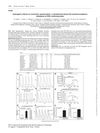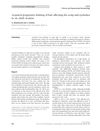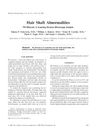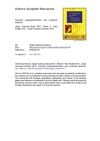 October 2019 in “European heart journal”
October 2019 in “European heart journal” Androgen-deprivation therapies increase the risk of certain heart conditions, but testosterone treatment may help.
 September 1998 in “JEADV. Journal of the European Academy of Dermatology and Venereology/Journal of the European Academy of Dermatology and Venereology”
September 1998 in “JEADV. Journal of the European Academy of Dermatology and Venereology/Journal of the European Academy of Dermatology and Venereology” The document concludes that individualized treatments for hair issues are effective, certain hair changes can indicate neurocutaneous diseases, specific lotions improve skin health, laser hair removal works but needs more study on long-term effects, men's cosmetics are diverse, peeling is effective but can have side effects, and facial pigmentation is often due to overactive skin cells.
 August 2021 in “EMC - AKOS - Trattato di Medicina”
August 2021 in “EMC - AKOS - Trattato di Medicina” Acquired alopecia is hair loss that can be reversible or irreversible, depending on whether the hair follicle is destroyed.
 May 2015 in “Journal of The American Academy of Dermatology”
May 2015 in “Journal of The American Academy of Dermatology” A woman with Parry-Romberg syndrome developed new curly hair on one side of her scalp, a condition not previously linked to the syndrome.
 6 citations,
December 2011 in “Clinical and Experimental Dermatology”
6 citations,
December 2011 in “Clinical and Experimental Dermatology” A woman developed rare, unexplained curly hair on her scalp and eyelashes.
5 citations,
December 2018 in “Annals of plastic surgery” Some burn patients grew extra hair in areas treated with pressure garments or silicone.
 11 citations,
October 2015 in “Journal der Deutschen Dermatologischen Gesellschaft”
11 citations,
October 2015 in “Journal der Deutschen Dermatologischen Gesellschaft” Women who had bariatric surgery risk nutritional deficiencies causing skin issues during pregnancy and breastfeeding.
 2 citations,
May 2021 in “Case reports in dermatological medicine”
2 citations,
May 2021 in “Case reports in dermatological medicine” A 28-year-old man with type 1 diabetes had skin and hair issues due to zinc deficiency.
 22 citations,
September 2004 in “Journal of The European Academy of Dermatology and Venereology”
22 citations,
September 2004 in “Journal of The European Academy of Dermatology and Venereology” Bimatoprost can cause longer, thicker, darker eyelashes and eyebrows.
26 citations,
April 2007 in “Journal of clinical oncology”  10 citations,
November 1997 in “British Journal of Dermatology”
10 citations,
November 1997 in “British Journal of Dermatology” A 10-year-old boy had the earliest reported case of hair that became progressively kinkier but eventually returned to normal on its own.
 May 2015 in “Journal of The American Academy of Dermatology”
May 2015 in “Journal of The American Academy of Dermatology” A heart transplant patient developed a skin condition called epidermodysplasia verruciformis after taking immune-suppressing drugs.
 33 citations,
August 1985 in “Archives of Dermatology”
33 citations,
August 1985 in “Archives of Dermatology” Acquired Progressive Kinking of Hair is likely an early sign of male pattern baldness.
 19 citations,
October 1985 in “British Journal of Dermatology”
19 citations,
October 1985 in “British Journal of Dermatology” The document concludes that unruly hair can be congenital or acquired, often lacks specific treatments, and can be managed with oils and short hairstyles.
 5 citations,
March 2009 in “Pediatric Dermatology”
5 citations,
March 2009 in “Pediatric Dermatology” The study found that pili bifurcati causes hair to intermittently split into two branches, each with its own outer layer.
 17 citations,
January 2015 in “Current problems in dermatology”
17 citations,
January 2015 in “Current problems in dermatology” Understanding and treating hair disorders in different ethnic groups requires knowledge of specific hair care practices and hair characteristics.
15 citations,
March 1996 in “PubMed” Anorexia nervosa may cause a hair defect called pili torti due to malnutrition and high vitamin A levels.
 1 citations,
April 2016 in “The American Journal of the Medical Sciences”
1 citations,
April 2016 in “The American Journal of the Medical Sciences” The document concludes that doctors should check for frontal fibrosing alopecia in patients with acquired hyperpigmentation and that early treatment is important.
 44 citations,
November 1998 in “Australasian Journal of Dermatology”
44 citations,
November 1998 in “Australasian Journal of Dermatology” Accurate diagnosis is key for treating different kinds of hair loss, and immune response variations may affect the condition and treatment results.
 July 2018 in “British Journal of Dermatology”
July 2018 in “British Journal of Dermatology” Hair regrowth was seen in 83% of children with alopecia, immune system plays a role in the condition, and various treatments showed effectiveness for hair and nail disorders.
 July 2024 in “Berkala Ilmu Kesehatan Kulit dan Kelamin”
July 2024 in “Berkala Ilmu Kesehatan Kulit dan Kelamin” Proper diagnosis and treatment of hair loss in children are crucial to prevent lasting issues and maintain their quality of life.
 15 citations,
September 2018 in “Medicine”
15 citations,
September 2018 in “Medicine” Childhood ptosis can vary from a minor cosmetic issue to a serious condition and may signal other health problems.
 February 2024 in “International journal of advanced academic studies”
February 2024 in “International journal of advanced academic studies” Understanding causes and treatments helps doctors manage hair loss effectively.
 April 2023 in “Our Dermatology Online”
April 2023 in “Our Dermatology Online” Trichoscopy is effective in diagnosing trichotillomania by showing specific hair patterns.
 32 citations,
August 2015 in “Anais Brasileiros de Dermatologia”
32 citations,
August 2015 in “Anais Brasileiros de Dermatologia” Black women's unique hair characteristics and styling practices can lead to specific scalp conditions, which require early diagnosis and appropriate treatment.

Afro-textured hair is more fragile and prone to certain scalp conditions, requiring careful treatment and more research for effective management.
3 citations,
February 2013 in “Actas dermo-sifiliográficas/Actas dermo-sifiliográficas” A 6-year-old boy developed excessive hair growth after taking diazoxide for low blood sugar.
 September 2017 in “Pediatric Dermatology”
September 2017 in “Pediatric Dermatology” A 14-year-old boy was diagnosed with a rare hair condition that may lead to hair thinning and has no known effective treatments.
6 citations,
December 2013 in “Journal of Investigative Dermatology Symposium Proceedings” Alopecia areata involves complex immune and genetic factors, with potential treatment targets identified, but more research is needed.
 15 citations,
October 2016 in “Journal of dermatological treatment”
15 citations,
October 2016 in “Journal of dermatological treatment” Proper hair care can prevent and stop hair breakage in people with acquired trichorrhexis nodosa.
























